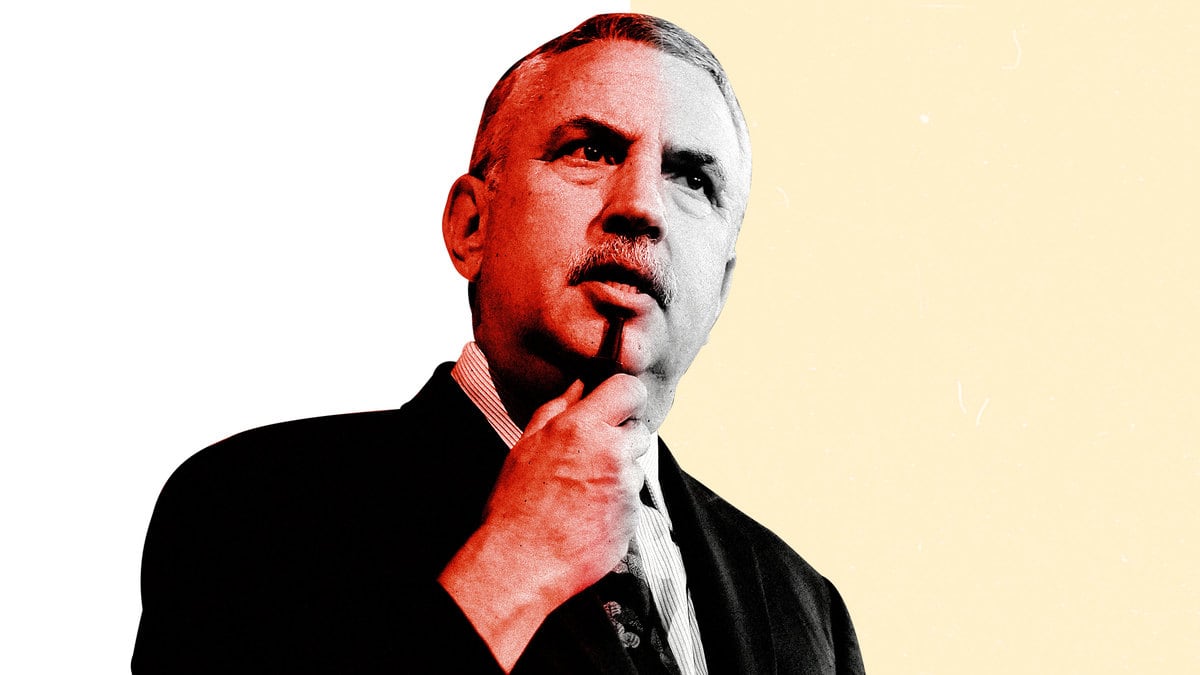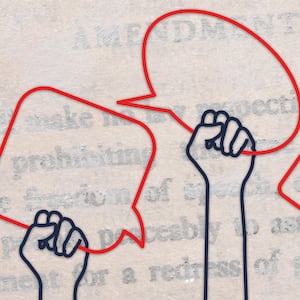New York Times columnist Thomas Friedman seems to be suffering from amnesia.
How, he asks in a column in yesterday’s Times, is the world supposed to live with a “country led by a war criminal with a seat on the Security Council” when that country launched an “unprovoked invasion” of another nation? What becomes of the “broad framework” of global peace and security when a superpower immune from UN punishment commits atrocities like the “crushing of cities” in the territory it’s invading? Russia’s invasion of Ukraine, Friedman suggests, has created a situation “the likes of which we have not known since 1989—and possibly 1939.”
I can only assume that the columnist has forgotten about George W. Bush’s illegal and unprovoked invasion of Iraq in 2003—and the way Friedman himself ran propagandistic cover for that invasion in the pages of The New York Times. For years.
ADVERTISEMENT
Bush’s justification for invading Iraq wasn’t much more coherent than Putin’s bizarre speech rambling about “demilitarizing and denazifying” Ukraine. The official theory was that Saddam Hussein might be developing “weapons of mass destruction” and that Iraq’s secular dictator, after spending decades brutally suppressing Islamic fundamentalists, might inexplicably decide someday to share his weapons with his mortal enemies in al Qaeda. And that we couldn’t afford to think too hard about that idea, never mind wait for meaningful evidence—because in the immortal words of then-Vice President Dick Cheney, the “smoking gun” might be “a mushroom cloud.”
Thomas Friedman had a simpler justification for the invasion.
In an infamous 2003 interview with Charlie Rose, Friedman argued that there was a “bubble” in the 1990s where Islamic extremists thought they could get away with terrorism and the solution was that the United States needed to go over to “that part of the world” and “burst that bubble.”
It’s important to stop for a moment here and take note of the fact that Friedman’s idea wasn’t that we specifically needed to attack Iraq. Friedman didn’t even bother to claim to Charlie Rose that there was, for example, a link between Iraq and the 9/11 terrorist attacks. Instead, he said that the problem is that “they” needed to see that Americans didn’t care so much about our “stock options and Hummers” that we were unwilling to make sacrifices.
What was the “they,” exactly? Muslim extremists? Muslims in general? The Middle East as a region? Friedman casts a very wide net:
“What they needed to see was American boys and girls going house to house—from Basra to Baghdad—and basically saying:
“Which part of this sentence don’t you understand?: You don’t think we care about our open society? You think this fantasy—we’re just gonna let it grow? Well, suck. On. This. That, Charlie, was what this war was about. We coulda hit Saudi Arabia… We coulda hit Pakistan. We hit Iraq because we could.”
In his column on the invasion of Ukraine, Friedman describes Vladimir Putin, who’d hoped for an easy victory, as having “gotten so much wrong.” That’s true. But I do wonder if he remembers his own series of predictions that “the next six months” would be do-or-die in terms of America’s prospects for delivering a decent outcome in Iraq. He said this on 11/30/03, 6/3/04, 10/3/04, 11/28/04, 9/28/05, 12/28/05, 1/23/06, 3/2/06, 4/23/06, and 5/11/06 and that’s not a complete list. Friedman used to be notorious for buttressing the analysis in his columns with conversations he reported having had with anonymous cab drivers in various parts of the world who—as one 2012 summary put it, “confirm his own views of the world” with “astonishing regularity.” You can still check out the old tweets by a long-running parody account called @TaxiWisdom whose profile picture is a close-up of Friedman’s mustache.
Fewer Friedman readers may remember that he once claimed that he “often begin[s] writing columns” by interviewing himself.
I swear I’m not making this up. He said it. I don’t know if he interviewed himself before he wrote the column that ran yesterday, or at least before he pressed “send.” If he did, I suspect he didn’t think to ask himself whether “the crushing of cities” in Ukraine might bear any resemblance to the “shock and awe” bombing of Iraq during the 2003 invasion or later horrors like the siege of Fallujah in November 2003. The Red Crescent estimated that the US bombardment of that city might have cost 6,000 lives. A study eight years later showed that more than half of the babies born in Fallujah had birth defects. Researchers pointed to the US military’s heavy use of white phosphorus and depleted uranium munitions during the siege as possible culprits.
I don’t imagine he asked himself whether the use of cluster bombs in Iraqi cities might have been as much of a war crime as their current use in Ukrainian cities, or what exactly the world was supposed to do about any of this given that the perpetrator was a superpower with a permanent seat on the UN Security Council. I hear a lot these days about “whataboutism.” If this refers to the practice of bringing up American crimes during discussion of Russian ones in order to defend the Russian crimes, I agree that whataboutism is bad. Friedman’s column, though, vividly demonstrates the costs of never considering such analogies in the first place.
If you want to develop defensible and internally consistent principles about how to think about and deal with the misdeeds of superpowers, you need to think long and hard about analogies between what your side does and what the other side does. And even if you don’t care about that, you should still spend at least a little time considering such analogies—if only so you don’t end up sounding like quite as much of a jackass as Thomas Friedman.







